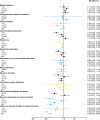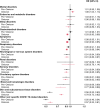Post-COVID conditions following COVID-19 vaccination: a retrospective matched cohort study of patients with SARS-CoV-2 infection
- PMID: 38778026
- PMCID: PMC11111703
- DOI: 10.1038/s41467-024-48022-9
Post-COVID conditions following COVID-19 vaccination: a retrospective matched cohort study of patients with SARS-CoV-2 infection
Abstract
COVID-19 vaccinations protect against severe illness and death, but associations with post-COVID conditions (PCC) are less clear. We aimed to evaluate the association between prior COVID-19 vaccination and new-onset PCC among individuals with SARS-CoV-2 infection across eight large healthcare systems in the United States. This retrospective matched cohort study used electronic health records (EHR) from patients with SARS-CoV-2 positive tests during March 2021-February 2022. Vaccinated and unvaccinated COVID-19 cases were matched on location, test date, severity of acute infection, age, and sex. Vaccination status was ascertained using EHR and integrated data on externally administered vaccines. Adjusted relative risks (RRs) were obtained from Poisson regression. PCC was defined as a new diagnosis in one of 13 PCC categories 30 days to 6 months following a positive SARS-CoV-2 test. The study included 161,531 vaccinated COVID-19 cases and 161,531 matched unvaccinated cases. Compared to unvaccinated cases, vaccinated cases had a similar or lower risk of all PCC categories except mental health disorders (RR: 1.06, 95% CI: 1.02-1.10). Vaccination was associated with ≥10% lower risk of sensory (RR: 0.90, 0.86-0.95), circulatory (RR: 0.88, 0.83-0.94), blood and hematologic (RR: 0.79, 0.71-0.89), skin and subcutaneous (RR: 0.69, 0.66-0.72), and non-specific COVID-19 related disorders (RR: 0.53, 0.51-0.56). In general, associations were stronger at younger ages but mostly persisted regardless of SARS-CoV-2 variant period, receipt of ≥3 vs. 1-2 vaccine doses, or time since vaccination. Pre-infection vaccination was associated with reduced risk of several PCC outcomes and hence may decrease the long-term consequences of COVID-19.
© 2024. The Author(s).
Conflict of interest statement
L.S.S. reports research support from Moderna for a COVID-19 vaccine effectiveness study and GlaxoSmithKline and Dynavax for unrelated studies. L.Q. reports research support from Moderna for a COVID-19 vaccine effectiveness study and GlaxoSmithKline and Dynavax for unrelated studies. S.Y.T. reports research support from Pfizer paid directly to institution for COVID-19 vaccine effectiveness and Paxlovid studies. C.C.F. reports research support from Pfizer and Johnson & Johnson for unrelated studies. I.A.L, B.J.L., C.E.B., D.L.M., D.T.A., D.E.M., D.S.R., E.S.W., J.C.N., J.T.W, M.F.D., M.L.H., R.K., S.S. and O.Z. have no conflict of interest to disclose.
Figures



References
MeSH terms
Substances
Grants and funding
LinkOut - more resources
Full Text Sources
Medical
Miscellaneous

